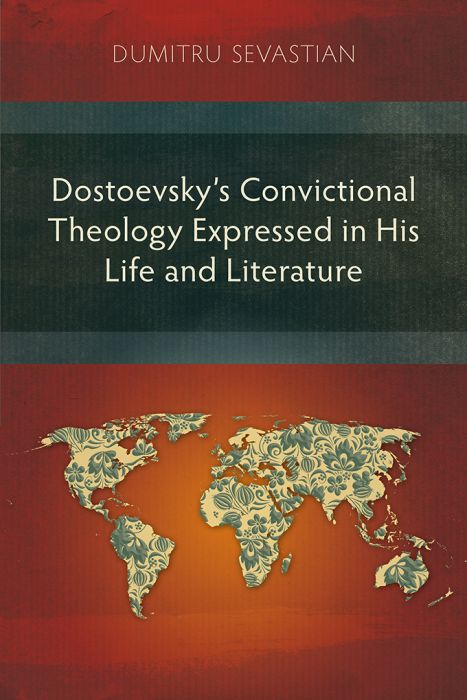| ISBN: | 9781839732027 |
|---|---|
| Imprint: | Langham Academic |
| Format: | Paperback |
| Dimensions (mm): | 229 x 152 x 17 |
| Publication Date: | 28/02/2021 |
| Pages: | 314 |
| Series: | Studies in Theology |
| Language: | English |

Dostoevsky’s Convictional Theology Expressed in His Life and Literature
Fyodor Dostoevsky was not a theologian, and his books are not books of theology. However, there is a “living way” that emerges from the study of his life and work, convictions made manifest in the details of his own life and the lives of his characters.
Utilizing James William McClendon’s conception of biography as theology, Dr. Dumitru Sevastian explores the lived convictions that emerge from three distinct periods in Dostoevsky’s life, the pre-Siberian, Siberian, and post-Siberian, each represented by one of his novels, The Poor Folk, The House of the Dead, and The Brothers Karamazov. What emerges is a powerful expression of faith formed in community and tempered in suffering, an example relevant to all Christians seeking to model their lives and relationships on the dying and resurrected Christ.
Endorsements
Working on the life and writings of Fyodor Dostoevsky, Dumitru Sevastian has produced an instructive exercise in reconstruction of this influential Russian writer’s theology. The book employs James Wm. McClendon’s “biography as theology” approach which provides the necessary interpretive lenses through which Dr Sevastian discovers Dostoevsky’s convictions and the communities which stood behind them and shaped them. This book demonstrates how life events and communities of influence leave their imprint on one’s convictions and embedded theology. This is a good example of how to do theology biographically.
Oleksandr Geychenko, PhD
Rector,
Odesa Theological Seminary, Odesa, Ukraine
It was a pleasure to read this systematically worked through material by Dumitru Sevastian of Dostoevsky’s novels. Often I have looked at the question of Dostoevsky and his faith struggles and convictions, reflecting more personally on the Eastern European context and Christianity. This research, that speaks so well to an Eastern Slavic soul, has helped me to see a clearer picture of Dostoevsky and his faith. I very much look forward to seeing this dissertation as a book to be read by many others.
Peter Penner, ThD, Dr Habil
Director of Advanced Studies,
Euro-Asian Accrediting Association
Dr. Dumitru Sevastian’s book is excellent research, showing a new perspective on the theology of Dostoevsky through his life experiences and convictions. It is an investigation of character in community through Dostoevsky’s main books (The Poor Folk, The House of the Dead and The Brothers Karamazov). Dr. Sevastian has demonstrated how the convictional theology of Dostoevsky can be an example for the life and mission of modern people living in different cultures.
Sergiy Sannikov, PhD
Emeritus President,
Euro-Asian Accrediting Association
Table of Contents
- Abstract
- Acknowledgements
- Abbreviations
- Chapter 1 Introduction
- Foreword
- Moldavian Contemporary Society
- Moldavian Church – Its Mission and Vision
- Survey of Criticisms of Dostoevsky’s Religious Views
- Convictional Theology
- The Structure of the Study
- Conclusion
- Chapter 2 Pre-Siberian Period: The Quest
- Introduction
- Dostoevsky’s Convictions Shown in His Own Life During the Pre-Siberian Period
- Under Family Influence (1821–1834)
- The Academy of Engineers (1834–1843)
- Merging into Literary-Political Circles (1843–1849)
- Imprisonment (1849)
- Theological Motifs in The Poor Folk
- The Perfect World
- The Distorted World
- The Tragic End
- Conclusion
- Chapter 3 The Siberian Period: The Regeneration of Convictions
- Introduction
- Dostoevsky’s Convictions Shown in His Own Life During the Siberian Period
- On the Way to Siberia (1850)
- Katorga (1850–1854)
- Service in the Tsar’s Army (1854–1859)
- Theological Motifs in The House of the Dead
- The Sinfulness of Man
- Freedom
- The Image of God in Each Person
- Repentance – The Only Way to a Radical Life Change
- Conclusion
- Chapter 4 Post-Siberian Period: Self Sacrifice
- Introduction
- Dostoevsky’s Convictions Shown in His Own Life During the Post-Siberian Period
- Arrival in Petersburg (1859–1863)
- Significant Losses (1863–1866)
- Success and Acknowledgement (1867–1881)
- Theological Motifs in The Brothers Karamazov
- The Sinfulness of Man
- The Image of God in Every Person
- Faith in God
- Rebellion against God
- Christ-Like Living of Life
- Conclusion
- Chapter 5 Dostoevsky’s Theology
- Introduction
- Synthesis of His Life and Writings
- Scripture
- Christ
- Man
- Redemption
- The Church
- Conclusion
- Chapter 6 Influence of Dostoevsky’s Theology on Society
- Introduction
- Influence of Dostoevsky’s Theology on the Society of His Time
- Influence on Slavophilism: K. Leontiev
- Influence on Westernism: M. Antonovich
- Influence on the Narodnik Movement: N. Mikhailovskiy
- Influence on Radical Christian Thinkers: V. Soloviev
- Influence of Dostoevsky’s Theology on a Baptistic Community
- Faith in God
- Rebellion against God
- On the Way to God
- Life in God
- The Mission of the Christian
- Conclusion
- Chapter 7 Conclusion: The Challenge of Dostoevsky’s “Christ’s Way” for the MECBC
- Introduction
- Challenge for the Life of the MECBC
- Challenge for the Mission of the MECBC in Its Orthodox Context
- Conclusion
- Bibliography




